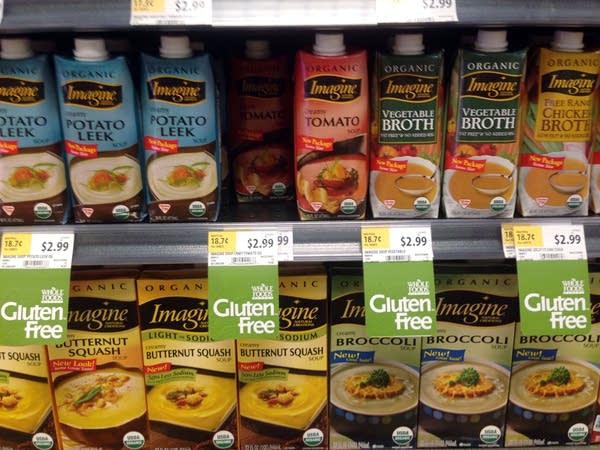That food you stopped eating? You may need it

Food allergies may be on the rise, but it's clear that people who don't have them are diagnosing and treating themselves as if they did. The Daily Circuit invited a doctor and a dietician to discuss the risks and benefits of fad diets like the popular movement to avoid gluten. Highlights from that conversation:
Don't throw out the nutritional baby with the diet bathwater:
"The more restricted diet that they're following, then the more risk of nutritional deficiencies. So it depends on what they're doing. Even with gluten sensitivity and celiac disease, there are many, many people who are interested in gluten-free products, but there are some health benefits to whole grains, including wheat, such as a decreased risk of cardio-vascular disease. So if people are eliminating foods unnecessarily from their diets, they may not be experiencing the health benefits of those foods." (Dr. Don Hensrud)
If you haven't got milk:
"A lot of people are eliminating foods, whether it be milk and dairy products or gluten, and again they're losing out on the nutritional value. Let's say it's milk, and they're eliminating it. That's nine essential vitamins and minerals that they can easily get in a glass of milk first thing in the morning, that's easy to put on cereal. What we find as well is, a lot of these diets that people follow, you're unable to keep up with them for a long period of time, and that's a really big issue, as well." (Dietician Toby Amidor)
A small fraction of those avoiding gluten actually need to:
"Up to 1 percent of people have true celiac disease, where a diagnosis has been made. There are specific tests to do that. And they definitely need to avoid gluten and wheat products and other sources of gluten for health reasons. There is a small percentage of other people who seem to have gluten sensitivity; they don't have celiac disease. The main issue there is symptoms. When they avoid gluten products, their symptoms improve. But there are many, many people, and this is the majority of people out there, who are avoiding gluten just because they think it's healthier. And it's really not, if you're not having any symptoms or don't have celiac disease." (Hensrud)
Don't diagnose yourself:
"It's a big misconception that we have out there. ... There are absolutely people who are diagnosed [with celiac disease], and they cannot have gluten products. And there is a misconception that taking out wheat from the diet is beneficial, will help with weight loss. In some instances, what people are seeing is, they're removing processed foods. You can eliminate them with or without wheat ... . People have to understand what's going on with their bodies before they start eliminating certain food groups. ... There's a disconnect because people like to self-diagnose. And they really need to work with their physician and a registered dietician in order to solve what's really going on. So before you treat — meaning eliminate a food or reduce a food, whatever it may be — you need to know what's going on. And a lot of people jump the gun, and they're eliminating the food before they're getting diagnosed." (Amidor)
An experiment in lactose intolerance:
"With lactose intolerance, you can do what's called a hydrogen breath test to diagnose it. People shouldn't diagnose themselves, but when I talk to patients, if they suspect lactose intolerance ... one way to find out on that is to try and avoid dairy products for a few days — that's more challenging than people realize — and then drink two glasses of milk on an empty stomach. And they'll know if they have lactose intolerance or not." (Hensrud)
Create a More Connected Minnesota
MPR News is your trusted resource for the news you need. With your support, MPR News brings accessible, courageous journalism and authentic conversation to everyone - free of paywalls and barriers. Your gift makes a difference.